“Far From the Tree” (2017 production, 2018 release). Cast: Andrew Solomon, Jason Kingsley, Emily Perl Kingsley, Jack Allnutt, Amy Allnutt, Bob Allnutt, Loini Vivao, Leah Smith, Joseph A. Stramondo, Howard Solomon, John Habich Solomon, Derek Reese, Lisa Reese, Tyler Reese, Rebecca Reese, Charles Kingsley (archive footage). Directors: Rachael Dretzin and Jamila Ephron. Book: Andrew Solomon, Far from the Tree. Web site. Trailer.
When a couple settles down to start raising children, the parents-to-be generally assume that everything is going to turn out “normal,” that their hopes and wishes for the typical “mainstream” family are going to materialize free of challenges and difficulties. But what happens when things don’t pan out as expected? Significant differences in any number of areas, from physical attributes to emotional temperaments to sexual orientation, can knock parents for a loop, leaving them to wonder what can or should be done for their offspring – if anything at all That’s the question posed in the engaging 2017 documentary, “Far From the Tree,” available for home viewing.
When gay author Andrew Solomon was growing up, he knew his sensibilities were different from those of other boys his age. The things that typically interested his peers held no appeal for him. And, as he grew older, he also realized this carried over into the area of sexuality. He wondered why he was different and often fretted over his attraction to members of the same gender, even going so far as to look for solutions to change his ways, such as paying visits to female sex workers in hopes that they would be able to “convert” him. Alas, though, nothing worked, and he realized his only choice was to accept or deny his orientation; change was not an option.
Solomon took the bold move to accept himself and be open about it, a risky venture during a far less tolerant time. It initially cost him his relationship with his parents, especially his mother, Carolyn, who drilled the notion into his head that he would never be happy, mainly because of the inherent “instability” of gay relationships. Nevertheless, Solomon stayed with his decision and sought to make his way in the world.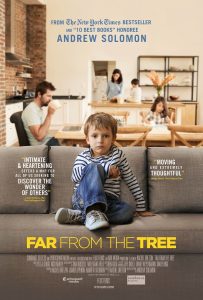
During his process of self-discovery, Solomon asked himself how he could end up so unlike the family into which he was born. But, the more he pondered this question, the more he expanded his inquiry into differences of other kinds, be they emotional, physical or behavioral. How did the parents and families of children who exhibited such other distinctions handle their situations? Did they view their kids’ conditions as “differences” or “disabilities”? Did they see their sons and daughters as saddled with handicaps, or were their children posed with challenges to address and overcome? Indeed, as Solomon himself put it, were these deviations from the norm meant to be looked upon as things to be fixed or celebrated?
It was with those questions in mind that Solomon set about to write what would eventually become the best-selling, much-applauded nonfiction title, Far from the Tree, the book that formed the basis for this documentary. In addition to exploring his own personal odyssey, his book and this film examine the special needs and circumstances of children who turned out vastly different from their parents and siblings. Through these cinematic and literary channels, author Solomon and filmmakers Rachel Dretzin and Jamila Ephron address the experiences of families affected by children with Down syndrome, autism, dwarfism and criminality. The result is a series of remarkable stories in which the challenges were great and hard-fought solutions took considerable effort to be realized – but often with inspiring results. These apples may have fallen, bounced and rolled considerable distances from their boughs, but the fruit is in many respects just as ripe.
Consider, for example, the experience of Jason Kingsley, who was born with Down syndrome. At the time of his birth, his mother, Emily, was advised to give up the child and have him committed to a special facility, essentially out of sight and away from public view. Emily’s health care providers explained that Jason wouldn’t have much of a life, unable to learn and to interact with society in the same way that other children do. It was widely believed that their suggested solution – the standard at the time – would remove the “burden” of trying to raise a child with such a condition, easing life for Emily and her husband, Charles.
[caption id="attachment_11491" align="aligncenter" width="350"]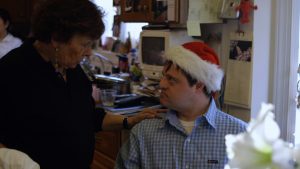 Born with Down syndrome, Jason Kingsley (right) has achieved much in his life, thanks to the tireless efforts of his mother, Emily (left), as seen in the excellent 2017 documentary, “Far From the Tree,” available for home viewing. Photo courtesy of Sundance Selects.[/caption]
Born with Down syndrome, Jason Kingsley (right) has achieved much in his life, thanks to the tireless efforts of his mother, Emily (left), as seen in the excellent 2017 documentary, “Far From the Tree,” available for home viewing. Photo courtesy of Sundance Selects.[/caption]
Emily and Charles, however, would have none of that. They didn’t buy into the idea that Jason was fundamentally incapable of attaining an education; they believed that he could grow up to have a meaningful, productive and contributing life. But, even more important than that, they simply couldn’t abide by the idea of just giving him away. As Emily put it, one doesn’t stop loving a child just because he or she might have a special condition; a parent just doesn’t do that.
And, as it turned out, Emily and Charles were right. Jason mastered subjects that he supposedly wasn’t capable of learning. He even became something of a celebrity, appearing as an actor on episodes of such TV shows as Sesame Street, The Fall Guy and Touched by an Angel, as well as a guest on talk shows. He graduated from high school and a post-secondary school for students with special needs, and he has since gone on to hold a full-time job and live mostly independently with two other Down syndrome housemates.
Jack Allnut has followed a life path in many ways similar to Jason Kingsley. His parents, Amy and Bob, say that Jack’s early life was seemingly normal. But, then, while a toddler, he began to withdraw, unable to speak and often acting out in tantrums. It became apparent that he was autistic, and nothing Jack’s parents did seemed to help – until they met a special therapist who discovered that a remarkable individual resided within Jack. Through an unorthodox treatment technique, the therapist was able to communicate with Jack in a special way. Jack explained that he understood what was going on around him but that he was unable to convey his thoughts through speech, a hindrance that relentlessly frustrated him and prompted much of his behavior. However, with this new channel of communication now open, the Allnut family discovered that Jack was highly intelligent – an aptitude he applied to schooling, achieving exceptional grades in many of his classes.
[caption id="attachment_11492" align="aligncenter" width="350"]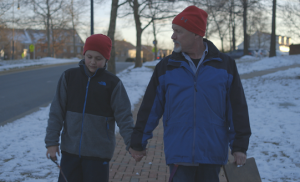 Jack Allnutt (left), who developed autism at a young age, has learned how to manage his condition and become a stellar student thanks to special therapy and the loving support of family members like his father, Bob (right), as chronicled in the documentary “Far From the Tree.” Photo courtesy of Sundance Selects.[/caption]
Jack Allnutt (left), who developed autism at a young age, has learned how to manage his condition and become a stellar student thanks to special therapy and the loving support of family members like his father, Bob (right), as chronicled in the documentary “Far From the Tree.” Photo courtesy of Sundance Selects.[/caption]
Carrying on a “normal” social life and being able to have a family life are difficult when one is half as tall as everyone else. Just ask Loini Vivao, Leah Smith and Joseph A. Stramondo. But that doesn’t mean it’s impossible, either. These three adults who have grown up with dwarfism may not share the same physical attributes as their full-sized peers, but that doesn’t mean they don’t want the same things out of life as their taller counterparts. Their stories are examined in various ways, such as their attendance at conferences and social gatherings organized specifically for them, as well as the determined efforts of husband and wife Joseph and Leah to have a child. The means for addressing their needs may be different in nature from those of Jason and Jack, but the empowering assistance they receive from their respective support resources (particularly family members) is just as significant. And the incalculable impact of all this is meaningful beyond measure for the lives they seek to lead.
For all these success stories, however, some others are painful, no matter how earnestly one tries to address them. Such is the case for the Reese family, whose teenage son, Trevor, was convicted of an inexplicable, brutal murder of a young child. Trevor had what appeared to be a bright future ahead of him until he committed this senseless killing, an incident so shocking and out of character that even the perpetrator doesn’t know why he did it. He pled guilty to the charges, sparing him the death penalty but resulting in a sentence of life in prison.
The fallout in this case has left the family with what is arguably the greatest burden to bear in all of these stories, given that the fruit has fallen farthest from the tree and saddled them with a future that realistically holds the dimmest prospects for change. Parents Derek and Lisa and their other two children, Tyler and Rebecca, picked up and moved out of state in hopes of a new start, but difficulties linger. Derek and Lisa explain that they often find themselves being vague about their past when meeting new people, given that being too candid frequently doesn’t help in forging new friendships. And Tyler and Rebecca have said that they have no desire to become parents, decisions made out of an abundance of caution. The family still communicates with Trevor, trying to offer whatever encouragement they can under these trying conditions. But, given what the Reeses are up against, what more can they do than continually hope for the best for everyone – even Trevor – going forward?
[caption id="attachment_11493" align="aligncenter" width="350"]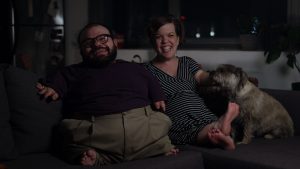 Husband and wife Joseph A. Stramondo (left) and Leah Smith (right) won’t let dwarfism stop them from becoming parents, as detailed in “Far From the Tree.” Photo courtesy of Sundance Selects.[/caption]
Husband and wife Joseph A. Stramondo (left) and Leah Smith (right) won’t let dwarfism stop them from becoming parents, as detailed in “Far From the Tree.” Photo courtesy of Sundance Selects.[/caption]
And then there’s Andrew’s story, which, like the others, started out with more than its share of difficulties. Over time, though, with changes in social conditions and greater acceptance of alternate lifestyles, the author has come into his own as a successful writer. He has also forged a happy home life with his husband, John, and their many children. But, perhaps most importantly, Andrew has made peace with his father, Howard, proving that, when it comes to the bond of blood relations, sometimes the distance from the branches doesn’t matter a bit.
At first glance, many might look upon the situations of these families and individuals as tragic. How can one bear up under such conditions? Is there no hope for a fulfilling life? What is one to do?
However, as these stories illustrate, remarkable miracles often come out of such circumstances. Unexpected joys, heartfelt love, tremendous accomplishments and the means to help others often result from such scenarios, and there’s much to be said for that. It may take getting past some well-entrenched social stigmas and inherent challenges, but that does not mean all is lost, especially if one believes to the contrary. And that belief component is crucial, for it drives the conscious creation process, the philosophy that maintains these intangible resources are drawn upon in manifesting the reality we experience.
If that’s true, though, one might rightfully ask, “Why would anyone materialize such arduous conditions in the first place?” That’s a legitimate question given the difficulties involved in handling such situations. But the reasons behind why any of us manifests what we do is our business and not subject to outside scrutiny or judgment, no matter how innately challenging those circumstances are.
In many cases, individuals and families who create such conditions do so to learn particular life lessons, including those that may be difficult to endure. Given that conscious creation makes anything possible, and considering that our being’s greater purpose is to know what it’s like to experience the full range of existence, at some point we may well choose to go through some of these more challenging undertakings. We may not be consciously aware that we have decided to do so, nor may we even be aware of conscious creation as a practice. However, that does not mean we don’t employ it in manifesting the lives we lead, to see what they have to offer (for better or worse), to determine if we’re able to overcome their intrinsic limitations and to explore what our experiences may contribute to the overall human condition. Those are sincerely noble aspirations, and what we experience through these opportunities may truly astonish us and our peers.
[caption id="attachment_11494" align="aligncenter" width="350"]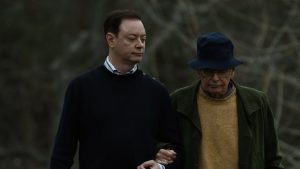 After years of struggles over his sexuality, gay author Andrew Solomon (left) has made peace with his father, Howard (right), as detailed in the documentary “Far From the Tree,” based on the writer’s best-selling, critically acclaimed book of the same title. Photo courtesy of Sundance Selects.[/caption]
After years of struggles over his sexuality, gay author Andrew Solomon (left) has made peace with his father, Howard (right), as detailed in the documentary “Far From the Tree,” based on the writer’s best-selling, critically acclaimed book of the same title. Photo courtesy of Sundance Selects.[/caption]
This is especially true when it comes to such undertakings as overcoming fears and pushing past limitations. Through these ventures, we may well see that we’re capable of so much more than we truly thought possible, and this applies to both the individuals directly affected, as well as those around them. By trying out alternate lines of probability, we may end up devising inventive solutions to longstanding difficulties. This can end up benefitting not only us, but also others who are similarly situated. And, in that regard, we may end up doing great services to humanity in the arts, technology, health and well-being, and other areas of endeavor. Conscious creators refer to this as the practice of value fulfillment, that of being our best, truest selves for the betterment of our individual beings, as well as the whole of mankind. Who would think that such innovation could emerge from what many others may offhandedly refer to as “adversity”?
This excellent examination of how individuals and families cope with various challenges that place them outside the mainstream of society enlightens and inspires throughout. While the documentary could use expansion in some areas and judicious snipping in others, the overall production is insightful, especially when it comes to redefining what actually constitutes the meaning of “family,” as well as what conditions need to be encouraged rather than altered or eliminated. “Far From the Tree” is likely to leave viewers with a wide range of impressions that they haven’t considered before. Check it out on DVD or video on demand – you’re sure not to be disappointed.
The lives we lead may not be for everyone. They may deviate significantly from what others believe we should want and from what they have painstakingly prepared for us. But, then, what we bring out of these experiences may end up being immeasurably more uplifting and meaningful, and not just for ourselves. We may like to believe that apples shouldn’t fall far from their trees, but sometimes working in a little distance can prove to be revelatory for us as individuals, as families, and, in the long run, as a species.
Copyright © 2020, by Brent Marchant. All rights reserved.
Wednesday, May 27, 2020
‘Far From the Tree’ explores the extension of our roots
Subscribe to:
Post Comments (Atom)

No comments:
Post a Comment